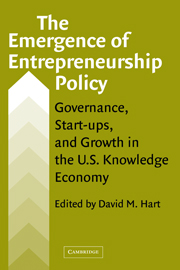 The Emergence of Entrepreneurship Policy
The Emergence of Entrepreneurship Policy Book contents
- Frontmatter
- Contents
- Editor's Acknowledgments
- Contributors
- PART ONE THE ENTREPRENEURIAL SOCIETY: WHAT'S GOVERNANCE GOT TO DO WITH IT?
- PART TWO HIGH-TECH ENTREPRENEURSHIP: THE UNIVERSITY-INDUSTRY-GOVERNMENT CONNECTION
- 4 Start-ups and Spin-offs: Collective Entrepreneurship Between Invention and Innovation
- 5 Entrepreneurship and American Research Universities: Evolution in Technology Transfer
- 6 America's Entrepreneurial Universities
- PART THREE EQUITY ISSUES IN ENTREPRENEURSHIP POLICY
- PART FOUR SECTOR-SPECIFIC ISSUES
- PART FIVE IMPLEMENTING ENTREPRENEURSHIP POLICY
- Afterword
- References
- Index
5 - Entrepreneurship and American Research Universities: Evolution in Technology Transfer
Published online by Cambridge University Press: 18 December 2009
- Frontmatter
- Contents
- Editor's Acknowledgments
- Contributors
- PART ONE THE ENTREPRENEURIAL SOCIETY: WHAT'S GOVERNANCE GOT TO DO WITH IT?
- PART TWO HIGH-TECH ENTREPRENEURSHIP: THE UNIVERSITY-INDUSTRY-GOVERNMENT CONNECTION
- 4 Start-ups and Spin-offs: Collective Entrepreneurship Between Invention and Innovation
- 5 Entrepreneurship and American Research Universities: Evolution in Technology Transfer
- 6 America's Entrepreneurial Universities
- PART THREE EQUITY ISSUES IN ENTREPRENEURSHIP POLICY
- PART FOUR SECTOR-SPECIFIC ISSUES
- PART FIVE IMPLEMENTING ENTREPRENEURSHIP POLICY
- Afterword
- References
- Index
Summary
American research universities have long served as a source of invention and technological expertise for industry (Rosenberg and Nelson 1994). This relationship, traditionally at arm's length, has entered a new era marked by closer interaction as universities actively manage their intellectual property in a process known as technology transfer. Moving beyond publication and teaching, the traditional modes of disseminating academic inventions, many universities now have technology transfer offices dedicated to securing invention disclosures from campus research and establishing intellectual property rights over them. These offices work to license to firms the rights to use the intellectual property, sometimes encouraging the formation of new firms for this purpose.
This chapter employs the term “entrepreneurship” in two distinct senses. The first, drawing on Clark (1998), who coined the phrase “entrepreneurial universities,” conveys the broader and more active role that American research universities now play in facilitating technology diffusion and promoting economic growth within the national system of innovation. The second meaning of the term coincides with Hart's definition in the introductory chapter to this volume, referring to the formation of firms based on university research.
Entrepreneurship in this second, narrower sense has become a favored mechanism by which universities transfer technology to the commercial realm. Based in part on the examples of the Massachusetts Institute of Technology (MIT) and Stanford University, which played active roles in the genesis of industrial clusters along Route 128 and in Silicon Valley respectively, university spin-off firms are seen as a means to transform local economies and a mechanism that provides a way for these economies to capture the benefits of proximity to research universities.
- Type
- Chapter
- Information
- The Emergence of Entrepreneurship PolicyGovernance, Start-Ups, and Growth in the U.S. Knowledge Economy, pp. 92 - 112Publisher: Cambridge University PressPrint publication year: 2003
- 13
- Cited by


